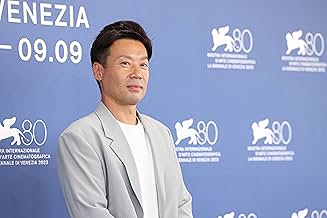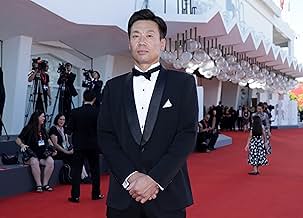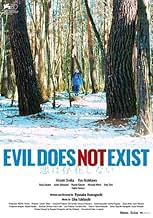VALUTAZIONE IMDb
7,0/10
11.917
LA TUA VALUTAZIONE
Takumi e Hana vivono a Mizubiki vicino a Tokyo circondati dalla foresta. Quando vengono a conoscenza di un piano per costruire un sito turistico lì, sanno che ciò avrà conseguenze disastrose... Leggi tuttoTakumi e Hana vivono a Mizubiki vicino a Tokyo circondati dalla foresta. Quando vengono a conoscenza di un piano per costruire un sito turistico lì, sanno che ciò avrà conseguenze disastrose per l'ecologia e la pulizia della loro comunità.Takumi e Hana vivono a Mizubiki vicino a Tokyo circondati dalla foresta. Quando vengono a conoscenza di un piano per costruire un sito turistico lì, sanno che ciò avrà conseguenze disastrose per l'ecologia e la pulizia della loro comunità.
- Regia
- Sceneggiatura
- Star
- Premi
- 17 vittorie e 45 candidature totali
Recensioni in evidenza
Ryusuke Hamaguchi has made some interesting movies in his career like Drive My Car, Happy Hour, and Asako I & II. While I haven't been wowed by his works, I appreciate many aspects of his style and approach.
Throughout, this movie has some wonderful colorful productions, camerawork, sound designs and atmosphere which helped add layers of the nature landscapes and environment. The narrative provides some interesting themes of nature, conflict of interest, humans and humans vs. Nature issues and explores some interesting aspects that are strong. The performances are all pretty good as well.
However, I am a bit underwhelmed with certain aspects as I found some of the themes feeling a little uneven to work Hamaguchi is wanting to express. Especially when it comes to the characters as while I did found some of the characters interesting, I didn't feel too emotionally connected with their personalities and purpose which made it a bit difficult to fully invest at times.
The soundtrack is wonderful and the dialogue is solid. The film does suffer some pacing issues and with an ending that leaves to many interpretations which may be frustrating for some. Overall, despite it's flaws, it's mediative and nature experience made this movie pretty good.
Throughout, this movie has some wonderful colorful productions, camerawork, sound designs and atmosphere which helped add layers of the nature landscapes and environment. The narrative provides some interesting themes of nature, conflict of interest, humans and humans vs. Nature issues and explores some interesting aspects that are strong. The performances are all pretty good as well.
However, I am a bit underwhelmed with certain aspects as I found some of the themes feeling a little uneven to work Hamaguchi is wanting to express. Especially when it comes to the characters as while I did found some of the characters interesting, I didn't feel too emotionally connected with their personalities and purpose which made it a bit difficult to fully invest at times.
The soundtrack is wonderful and the dialogue is solid. The film does suffer some pacing issues and with an ending that leaves to many interpretations which may be frustrating for some. Overall, despite it's flaws, it's mediative and nature experience made this movie pretty good.
The opening shot is mesmerising, disorientating, as Yoshio Kitagawa's camera pans under the tree tops to Eiko Ishibashi's haunting score. The start of Ryusuke Hamaguchi's "Evil Does Not Exist" reminds of Bela Tarr's "Satantango" (1994), with a slow-moving, natural, extended take. Not as extreme, but it sets the tone for what comes next.
Mizubiki village is a quiet mountain town a manageable drive from Tokyo. A minor holiday destination, investors want to set-up a glamping site, which naturally meets resistance from the locals. Takumi (Hitoshi Omika), a local odd-job man is cautious, but willing to meet the proposals halfway if they take the local environment into consideration.
Takahashi (Ryuji Kosaka) and Mayuzumi (Ayaka Shibutani) are the employees tasked with meeting the locals and convincing them of the project. Sympathetic to their hosts, they are people doing a job they don't necessarily believe in, and so are neither one thing or the other. Seeming to connect with Takumi, they feel a solution can be reached, but the reality is they are met with contempt from both sides.
Straightaway this enraptures you and you are immediately drawn into the small village and its humble ways. The brilliance of nature is emphasised throughout, and the opening moments show this perfectly. And as Takahashi and Mayuzumi try to deliver the initial presentation, key members of the community voice the importance of the environment on their health, community, work and business.
The last of these is the only focus the glamping project has in mind, thinking of the pretty landscape, and not the impact a modern resort will have on it. As Alex Kerr emphasises in his book "Hidden Japan," once you have been somewhere, you've already ruined it. The village elder (Taijiro Tamura) puts his point across succinctly: those living upstream must think of their impact on those downstream.
Often, I've found Hamaguchi's films, while good, can feel a little awkward. Characters and their interactions can feel wooden (perhaps due to his use of novice actors) and their motivations hard to grasp. "Drive My Car" (2021) was a step-up for him, and "Evil Does Not Exist" is by far his strongest in its script. It feels tighter, with arguments better put forward, in both the initial presentation and Takahashi and Mayuzumi's drive back to the village, where they share their career decisions. It is much more natural, though Takahashi's sudden desire to change careers may be a bit much for some.
Takumi's daughter Hana (Ryo Nishikawa) is a key character, but perhaps from the standard use of a young girl to represent pure innocence. The true star of the film is the forest of its setting and the film's true lasting memory, working in unison with the soundtrack.
The title of the film is enigmatic, as is the atmosphere throughout. The isolation of the forest community, and their connection to nature, show an innocence. But clear in their desires, they show they will fight to keep what's theirs. Takahashi and Mayuzumi may be the face of the more sinister corporate body behind them, but also show themselves to be useless pawns, simply carrying out their job.
Is simple self-sufficiency more noble than misguidedly following orders from above for profits? The ending confuses this question, its incompleteness difficult to process. The real question is whether it is better to do bad to protect what you believe in, rather than trying to diplomatically do something you don't believe in out of expectation. Silence is complicit.
The forest is deep, and it's easy to lose yourself.
Politic1983.home.blog.
Mizubiki village is a quiet mountain town a manageable drive from Tokyo. A minor holiday destination, investors want to set-up a glamping site, which naturally meets resistance from the locals. Takumi (Hitoshi Omika), a local odd-job man is cautious, but willing to meet the proposals halfway if they take the local environment into consideration.
Takahashi (Ryuji Kosaka) and Mayuzumi (Ayaka Shibutani) are the employees tasked with meeting the locals and convincing them of the project. Sympathetic to their hosts, they are people doing a job they don't necessarily believe in, and so are neither one thing or the other. Seeming to connect with Takumi, they feel a solution can be reached, but the reality is they are met with contempt from both sides.
Straightaway this enraptures you and you are immediately drawn into the small village and its humble ways. The brilliance of nature is emphasised throughout, and the opening moments show this perfectly. And as Takahashi and Mayuzumi try to deliver the initial presentation, key members of the community voice the importance of the environment on their health, community, work and business.
The last of these is the only focus the glamping project has in mind, thinking of the pretty landscape, and not the impact a modern resort will have on it. As Alex Kerr emphasises in his book "Hidden Japan," once you have been somewhere, you've already ruined it. The village elder (Taijiro Tamura) puts his point across succinctly: those living upstream must think of their impact on those downstream.
Often, I've found Hamaguchi's films, while good, can feel a little awkward. Characters and their interactions can feel wooden (perhaps due to his use of novice actors) and their motivations hard to grasp. "Drive My Car" (2021) was a step-up for him, and "Evil Does Not Exist" is by far his strongest in its script. It feels tighter, with arguments better put forward, in both the initial presentation and Takahashi and Mayuzumi's drive back to the village, where they share their career decisions. It is much more natural, though Takahashi's sudden desire to change careers may be a bit much for some.
Takumi's daughter Hana (Ryo Nishikawa) is a key character, but perhaps from the standard use of a young girl to represent pure innocence. The true star of the film is the forest of its setting and the film's true lasting memory, working in unison with the soundtrack.
The title of the film is enigmatic, as is the atmosphere throughout. The isolation of the forest community, and their connection to nature, show an innocence. But clear in their desires, they show they will fight to keep what's theirs. Takahashi and Mayuzumi may be the face of the more sinister corporate body behind them, but also show themselves to be useless pawns, simply carrying out their job.
Is simple self-sufficiency more noble than misguidedly following orders from above for profits? The ending confuses this question, its incompleteness difficult to process. The real question is whether it is better to do bad to protect what you believe in, rather than trying to diplomatically do something you don't believe in out of expectation. Silence is complicit.
The forest is deep, and it's easy to lose yourself.
Politic1983.home.blog.
A local benri-ya-san (handyman), a single father in a provincial town near Tokyo, gets involved with big city interlopers looking to see up an ill-conceived glamping project in the area.
I am not a fan of slow cinema or the long take, and feared the worst when this film opened on Takumi taking an age to chop firewood, then taking an age to gather water from a stream. But as the film stuck to its pace and Takumi gives daughter Hana a piggy-back through the forest, pointing out species of trees and wildlife tracks, I was drawn into the rhythm of Takumi's day-to-day existence. A discordant note arrived jarringly, as the haunting soundtrack abruptly cut out on the edit. As a device to create a sense of foreboding it could have been heavy-handed, but here it is a bold choice that sits in counterpoint with the natural beauty on display.
The story plays out the theme imbibed in the title resolutely. Takumi is no Crocodile Dundee; he knows nature and has an even temperament, but his forgetfulness leads him to forgetting to pick up his daughter once too often. And even at home, he obsesses over drawing when his daughter craves attention. His deceased wife is never mentioned, but her presence-through-absence hangs over every scene of family life.
The big city interlopers as first appear like pantomime villains. But then another side to them, too, is revealed. Takahashi comes across as a pompous fool in the village meeting, but there is a sincerity to his attempts to live a meaningful life, and we believe him when he talks during a long drive about wanting to dedicate his life to making his partner happy. His subordinate Mayuzumi at first appears to be the voice of pragmatism and common sense. But during the same drive we hear that she left a job as a carer to work in TV, a world she is fully aware is full of "lowlifes." She, too, has a shallow side. No one in this world is without shadows. When these three characters are thrown together in the film's last act, it is impossible to fathom where events will lead.
Where they do lead is to a point that audiences will either love or hate. Perhaps conditioned by the bum-numbing running time of Hamaguchi's previous film, Drive My Car, I for a fleeting moment thought the real action of the film was just beginning, when it suddenly ended. In a film full of jarring moments, this was the most impactful. Some might say egregious.
The performances Hamaguchi draws from his cast are flawless. I was stunned to read that Hitoshi Omika was an AD before this. His magnetism is simply off the scale. Ryûji Kosaka captures a certain kind of frail but annoying masculinity to a tee. Ayaka Shibutani shines in an understated but pitch perfect outing.
Evil Does Not Exist throws up a more questions than answers. It is an intriguing film, frustrating even, but Hamaguchi makes bold choices here and displays a confidence and maturity that is admirable. Three days after going to the cinema, I am still thinking about this film, still actually wondering if I liked it. Some are calling it a masterpiece, but I'm not so sure. It is though, without a doubt, well worth seeing.
I am not a fan of slow cinema or the long take, and feared the worst when this film opened on Takumi taking an age to chop firewood, then taking an age to gather water from a stream. But as the film stuck to its pace and Takumi gives daughter Hana a piggy-back through the forest, pointing out species of trees and wildlife tracks, I was drawn into the rhythm of Takumi's day-to-day existence. A discordant note arrived jarringly, as the haunting soundtrack abruptly cut out on the edit. As a device to create a sense of foreboding it could have been heavy-handed, but here it is a bold choice that sits in counterpoint with the natural beauty on display.
The story plays out the theme imbibed in the title resolutely. Takumi is no Crocodile Dundee; he knows nature and has an even temperament, but his forgetfulness leads him to forgetting to pick up his daughter once too often. And even at home, he obsesses over drawing when his daughter craves attention. His deceased wife is never mentioned, but her presence-through-absence hangs over every scene of family life.
The big city interlopers as first appear like pantomime villains. But then another side to them, too, is revealed. Takahashi comes across as a pompous fool in the village meeting, but there is a sincerity to his attempts to live a meaningful life, and we believe him when he talks during a long drive about wanting to dedicate his life to making his partner happy. His subordinate Mayuzumi at first appears to be the voice of pragmatism and common sense. But during the same drive we hear that she left a job as a carer to work in TV, a world she is fully aware is full of "lowlifes." She, too, has a shallow side. No one in this world is without shadows. When these three characters are thrown together in the film's last act, it is impossible to fathom where events will lead.
Where they do lead is to a point that audiences will either love or hate. Perhaps conditioned by the bum-numbing running time of Hamaguchi's previous film, Drive My Car, I for a fleeting moment thought the real action of the film was just beginning, when it suddenly ended. In a film full of jarring moments, this was the most impactful. Some might say egregious.
The performances Hamaguchi draws from his cast are flawless. I was stunned to read that Hitoshi Omika was an AD before this. His magnetism is simply off the scale. Ryûji Kosaka captures a certain kind of frail but annoying masculinity to a tee. Ayaka Shibutani shines in an understated but pitch perfect outing.
Evil Does Not Exist throws up a more questions than answers. It is an intriguing film, frustrating even, but Hamaguchi makes bold choices here and displays a confidence and maturity that is admirable. Three days after going to the cinema, I am still thinking about this film, still actually wondering if I liked it. Some are calling it a masterpiece, but I'm not so sure. It is though, without a doubt, well worth seeing.
Ryûsuke Hamaguchi's Evil Does Not Exist is a very slow burn of a film, a character study disguised as an eco-drama. Nestled in the serene Mizubiki Village, a community thrives on a deep connection to nature. Their tranquility is shattered by the arrival of slick Tokyo suits proposing a glamping resort-a luxurious "escape" to nature for city dwellers. What follows is a clash of values, a meditation on the complexities of progress, and the blurry line between good and evil.
Hamaguchi doesn't hit us over the head with environmental messages. Instead, he lets the beauty of the Japanese countryside speak for itself. Lush forests and tranquil rivers become characters, a stark contrast to the sterile, neon-lit world the city reps represent. This visual poetry is amplified by the film's score, a melancholic blend of strings and woodwinds that perfectly captures the tension between tradition and modernity.
The acting is understated, mirroring the film's pacing. Hitoshi Omika, as Takumi, the gruff but conflicted villager, delivers a nuanced performance. We see his internal struggle-the fear of change wrestling with the desire to protect his way of life. The Tokyo reps, played by Ryô Nishikawa and Ryûji Kosaka, are initially portrayed as villains, all smiles and empty promises. However, as the film progresses, their own vulnerabilities peek through, reminding us that there's rarely a clear-cut bad guy in real life.
The plot of Evil Does Not Exist unfolds deliberately, sometimes feeling glacial. There are long stretches of dialogue that, while beautifully written, could test the patience of viewers expecting a more action-oriented film. The ending, too, occurs at a point where there is no resolution to the story, leaving us to scratch our heads wondering what might happen rather than being told. But there is a reason for this. By ending the movie (but not the story) in this way, Hamaguchi forces us to confront our own perspectives on the story, a tactic that might backfire for those seeking easy answers. There aren't any.
This won't be a film for everyone. Forget it if you want a fast-paced thriller. You will be disappointed. However, if you appreciate slow cinema and nuanced character studies, Evil Does Not Exist offers a rewarding experience. While the untranslated credits rolled, I just sat there, reflecting on our relationship with nature, the allure of progress, and the shades of grey that exist between good and evil. If you enjoyed contemplative films like Burning or Drive My Car (I enjoyed Evil Does Not Exist more), Evil Does Not Exist is definitely worth a watch. Just be prepared for a slow burn and an ending that will leave you pondering.
Hamaguchi doesn't hit us over the head with environmental messages. Instead, he lets the beauty of the Japanese countryside speak for itself. Lush forests and tranquil rivers become characters, a stark contrast to the sterile, neon-lit world the city reps represent. This visual poetry is amplified by the film's score, a melancholic blend of strings and woodwinds that perfectly captures the tension between tradition and modernity.
The acting is understated, mirroring the film's pacing. Hitoshi Omika, as Takumi, the gruff but conflicted villager, delivers a nuanced performance. We see his internal struggle-the fear of change wrestling with the desire to protect his way of life. The Tokyo reps, played by Ryô Nishikawa and Ryûji Kosaka, are initially portrayed as villains, all smiles and empty promises. However, as the film progresses, their own vulnerabilities peek through, reminding us that there's rarely a clear-cut bad guy in real life.
The plot of Evil Does Not Exist unfolds deliberately, sometimes feeling glacial. There are long stretches of dialogue that, while beautifully written, could test the patience of viewers expecting a more action-oriented film. The ending, too, occurs at a point where there is no resolution to the story, leaving us to scratch our heads wondering what might happen rather than being told. But there is a reason for this. By ending the movie (but not the story) in this way, Hamaguchi forces us to confront our own perspectives on the story, a tactic that might backfire for those seeking easy answers. There aren't any.
This won't be a film for everyone. Forget it if you want a fast-paced thriller. You will be disappointed. However, if you appreciate slow cinema and nuanced character studies, Evil Does Not Exist offers a rewarding experience. While the untranslated credits rolled, I just sat there, reflecting on our relationship with nature, the allure of progress, and the shades of grey that exist between good and evil. If you enjoyed contemplative films like Burning or Drive My Car (I enjoyed Evil Does Not Exist more), Evil Does Not Exist is definitely worth a watch. Just be prepared for a slow burn and an ending that will leave you pondering.
This surreal 2023 film by Hanaguchi, begins as a straight narrative begining with opening micro/macro shots of Japanese landscape. It focused on a young village situated by rivers which becomes a possible site for Toyko's tourist industry.
It follows rural villagers who are not right with the recent interest of their surroundings by outsiders. During a planning session between them and reps from the tourist company, they learned that a Toyko based firm wants to create a "glamping" vacation site for urban trotters.
Things begin to clash between reps and the locals. The representatives reach back to Tokyo office who assigns them to interact more with villagers, how to learn from them. A direct and humble interaction of Toyko reps and locals ensues.
The rest of the story, evolves a beautiful piece of surrealism. Playing with subtleties with useful shots of the natural landscape match with the notion of what is evil. It's the corporate greed, and it's reluctance to understand basic principles of life without business interest.
Obviously these topics are designed within a Japanese cultural context, the average movie viewers will probably miss the clues or references leading up to an very questionable climax - what just happened. Supposedly this was the subjective outcome desired by the film's director.
The film's director (Hanaguchi) had an open ended situation for viewers' interpretations. This film tackles alot of allegorical symbols, within the nature of the woods and the human behaviour.
It follows rural villagers who are not right with the recent interest of their surroundings by outsiders. During a planning session between them and reps from the tourist company, they learned that a Toyko based firm wants to create a "glamping" vacation site for urban trotters.
Things begin to clash between reps and the locals. The representatives reach back to Tokyo office who assigns them to interact more with villagers, how to learn from them. A direct and humble interaction of Toyko reps and locals ensues.
The rest of the story, evolves a beautiful piece of surrealism. Playing with subtleties with useful shots of the natural landscape match with the notion of what is evil. It's the corporate greed, and it's reluctance to understand basic principles of life without business interest.
Obviously these topics are designed within a Japanese cultural context, the average movie viewers will probably miss the clues or references leading up to an very questionable climax - what just happened. Supposedly this was the subjective outcome desired by the film's director.
The film's director (Hanaguchi) had an open ended situation for viewers' interpretations. This film tackles alot of allegorical symbols, within the nature of the woods and the human behaviour.
Lo sapevi?
- QuizIn an interview with "The Los Angeles Times" published on May, 2, 2024, director Ryûsuke Hamaguchi decided to cast Hitoshi Omika as the lead role after Omika spent much time driving Hamaguchi around to rural locations in Japan to pick out locations to film for the director's concert film "Gift". This somewhat mirrored the plot of Hamaguchi's "Drive My Car".
- Colonne sonoreFether
composed by Eiko Ishibashi
I più visti
Accedi per valutare e creare un elenco di titoli salvati per ottenere consigli personalizzati
- How long is Evil Does Not Exist?Powered by Alexa
Dettagli
Botteghino
- Lordo Stati Uniti e Canada
- 831.685 USD
- Fine settimana di apertura Stati Uniti e Canada
- 42.752 USD
- 5 mag 2024
- Lordo in tutto il mondo
- 3.261.306 USD
- Tempo di esecuzione
- 1h 46min(106 min)
- Colore
- Mix di suoni
- Proporzioni
- 1.66 : 1
Contribuisci a questa pagina
Suggerisci una modifica o aggiungi i contenuti mancanti

























